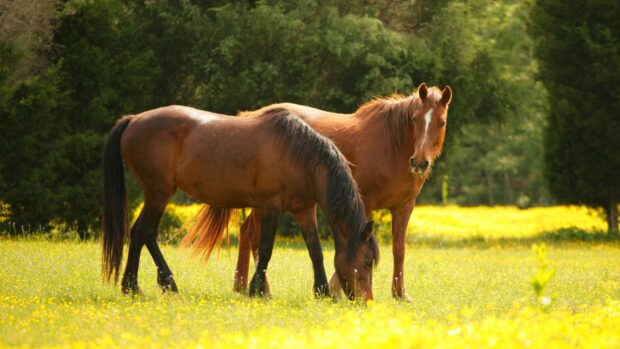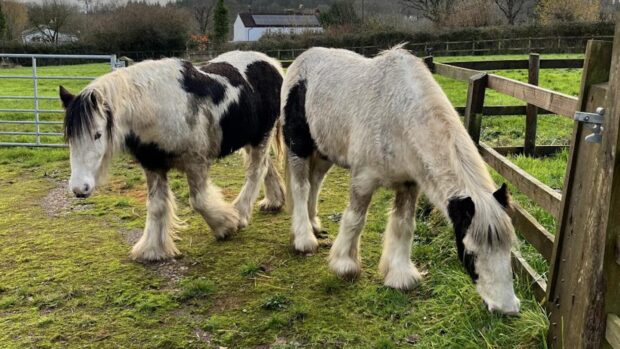Abandoned horses found straying on a road in Bristol have been rescued by an equine welfare charity.
The two horses, now called Pilgrim and Grace, were discovered in Avonmouth, an industrial area of the city near the River Severn.
Pilgrim had several injuries, both old and fresh.
The area has had a fly-grazing problem for several years. The charity, HorseWorld, believes these horses were dumped on industrial land, which is unsuitable for livestock, and escaped onto the road.
B&W Equine Vets were called on 19 January to reports of an injured mare and foal. They agreed to take them in overnight with the help of the RSPCA.

Pilgrim
“The mare turned out to be a two-year-old colt with multiple injuries, most notably a deep wound to his elbow, where he is believed to have fallen down on the road,” said HorseWorld’s Sarah Hollister.
“There were also multiple older injuries to the neck and shoulder, each between three and six months old.
“One of the old wounds shows evidence that he had been tethered for long periods of time as the skin on his neck has a thickened ridge where a collar would lie.”
Grace (pictured, top), who is thought to be around seven to eight months old, was uninjured but very frightened and unused to being handled.
Both horses were of average weight, but their potbellies indicated a heavy worm burden.
“Neither horse was microchipped, making finding an owner — and therefore being able to prosecute them — near impossible,” added Ms Hollister.
Mark Owen, also of HorseWorld, added that many landowners do not realise that, when a horse is on their land, the animal is their responsibility.
“If that horse escapes and causes an accident, the landowner could be liable for damages,” he said.
“With the number of horses currently escaping onto the roads from fly-grazed land on a regular basis, it is only a matter of time before there is a serious road accident involving both human and equine casualties, or even fatalities.”
The charity is building a campaign to tighten this area of the Control of Horses Act, which became law last year.
Related articles:
- Carole Mortimer: Living on the end of a rope in a public playing field is no existence *H&H VIP*
- England moves a step closer to stopping fly-grazing
- Fly-grazing act is working, says welfare charity
The “fly-grazing” bill resulted from a Private Members’ Bill, put forward by Julian Sturdy MP for York Outer. It makes small, but important changes to the Animals Act 1971.
The law gives private landowners the same powers as local authorities to take quick action to remove and move on fly-grazing horses.
The updated law requires landowners to keep any horses placed on their land for only four working days — as opposed to the current two weeks — and gives more options to dispose of the horses besides public sale, such as gifting them to a charity, selling them privately or euthanasia.




